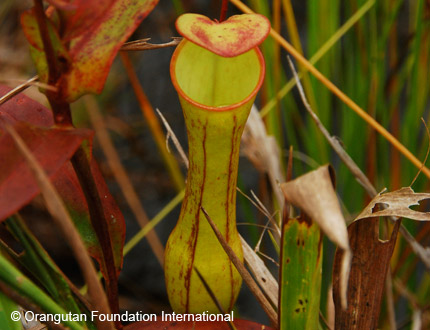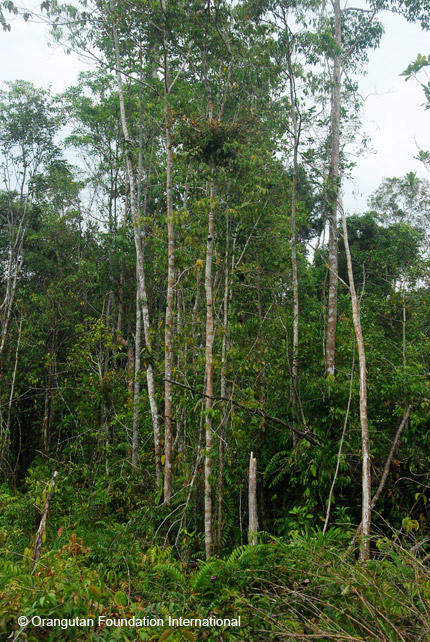Tags:
Forest Protection Purchase“Ada orangutan di hutan Pak Kukuh?” Are there orangutans in your forest? I ask.
“Ada. Anda mau lihat sarang orangutan?” There are. Would you like to see orangutan nests? Pak Kukuh answers.
I nod vigorously. “Tentu saja!”
We climb back onto the motorbikes and drive along muddy dirt roads towards a swampy area of lowland Bornean rainforest. I am spending the day in the woods with two OFI Care Center staff members and Pak Kukuh, an elderly Dayak man who has offered OFI 2,653 hectares of forest. Pak Kukuh recently approached OFI president Dr. Biruté Mary Galdikas, saying that he wanted to sell a large portion of his family’s land and preferred to have OFI purchase it, as opposed to interested palm oil plantation developers.
I am here to explore the land, find out more about the value of this forest, and to get an idea of local plant and animal biodiversity.
Once at the edge of the swamp forest, we leave the motorbikes behind. This is true peat swamp forest. Not only is it home to many endemic and rare species of plants and animals, it’s also a vital carbon sink. We hike into the swamp with Pak Kukuh leading the way. Navigating my way through the swampy undergrowth feels like passing through an obstacle course. Often, I sink up to my thighs in leafy muck and water that looks like dark tea. I jump from one tree’s exposed roots to another’s. Fallen trees provide treacherous bridges and hanging vines give me something to grab. I can hear birds in the canopy, cicadas near the ground, and bugs in my ears. The heat is thick and humid. This is prime orangutan habitat.
Sure enough, Pak Kukuh leads us to orangutan nests. We spot four nests in just 200 meters. Two nests, both looking a little brown, are side by side. One is much bigger than the other and I imagine a mother bedding down for the night while her offspring makes his or her own nest nearby. The other two nests both look very green and fresh. Orangutans have been here, to this area of swamp, recently. Perhaps they are still here now, hiding in the canopy, silently watching the four of us pass by underneath.

“Pohon papong” Pak Kukuh says, as he points to a tree beside him. He explains that the fruit of the Papong trees provide food for orangutans, macaque monkeys, red langurs, squirrels, and bats, all of whom live here in Pak Kukuh’s forest. He points out four more Papong trees from where he is standing. This rich and hostile swamp forest is excellent habitat not only for orangutans, but also for a broad cross-section of Bornean wildlife.
Unfortunately, forest doesn’t come cheap. In order to purchase this land, OFI must compete with timber, palm oil, and other development companies. We need to match the prices that they are able (and willing) to pay. Pak Kukuh and others like him feel strongly about their land and don’t like to see the forest clearcut – this is why the local landowners often approach OFI first – but they also need to think realistically. Pak Kukuh has a family, including many grandchildren, for which he provides. He cannot afford to accept anything less than what the wealthy development companies are able to offer.
OFI needs your help to raise this money. It is imperative that we keep this huge area of forest protected and pristine, safe from short-term, short-sighted development by people who have no regard for its true value. If this forest is cleared to make way for plantations, the carbon stored in the peat swamp will be released into the atmosphere, potentially exacerbating global warming. Furtheremore, the relic wild orangutan population that lives here now will be exterminated. Also the opportunity to create a much needed forest release site for future rehabilitated orangutans will be gone. We cannot let this haven be another casualty of greed and ignorance.
We invite you to donate to our land purchase program. Every little bit counts. To help us buy Pak Kukuh’s land you can donate directly or call or email our office for more details. Together, we can preserve another small piece of Eden in our world.



